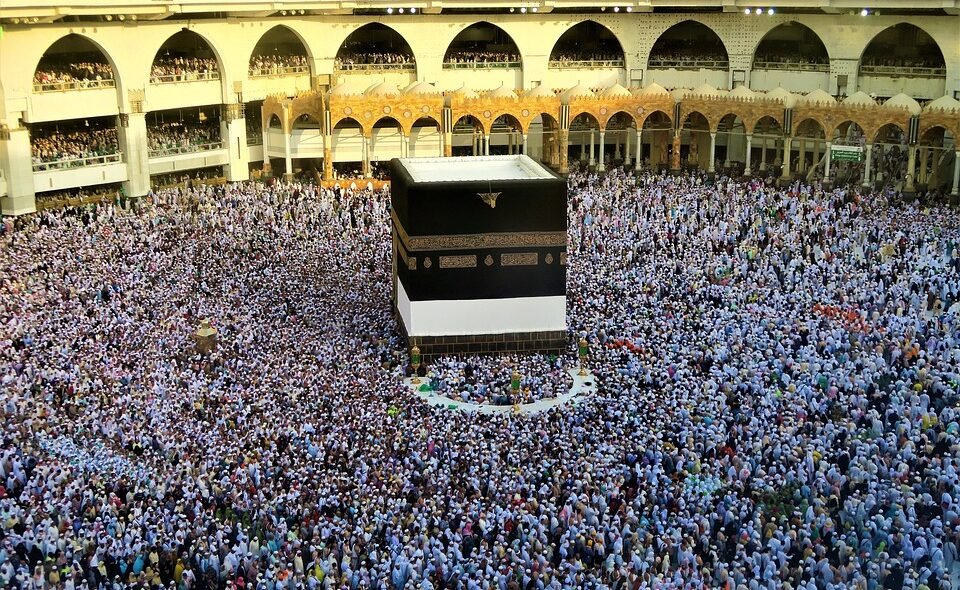| Topic | Summary | |————————————-|———————————————————————————————————————————————————————-| | Significance of Mecca for Muslims | Mecca is the birthplace of Prophet Muhammad and the holiest city in Islam, where the Kaaba was built by Prophet Abraham. It is the location of the Hajj pilgrimage. | | Preparation for the pilgrimage | Plan carefully, ensure good health, vaccinations, appropriate clothing. Engage in prayer, fasting, acts of kindness to prepare spiritually. | | Rituals of the Hajj pilgrimage | Tawaf, Sa’i, Wuquf, Stoning of the Devil, Sacrifice, Shaving/trimming hair. Symbolic rituals related to the lives of Prophet Abraham and his family. | | History of the Kaaba in Mecca | The Kaaba was built by Prophet Abraham and is considered the most sacred site in Islam. It holds the Black Stone, a holy relic. Muslims around the world face it when they pray. | | Conditions for performing Hajj | Sound mind, physical ability, financial capability, mature age, and free from debts or obligations. | | Social equality and unity in Hajj | The pilgrimage brings together Muslims from all backgrounds, promoting unity and equality through shared rituals. | | Spiritual benefits of performing Hajj | Hajj fosters sacrifice and devotion, promoting spiritual growth and connection to Allah. Pilgrims seek repentance and self-improvement. | ### FAQ
1. How can I prepare for the Hajj pilgrimage?
2. What are some common challenges faced during Hajj?
3. How does Hajj promote social equality and unity among Muslims?
4. What are some tips for making the most of the Hajj experience?
5. Are there financial assistance options for those who cannot afford to perform Hajj?
6. What are the spiritual benefits of performing Hajj?
7. What are some common misconceptions about the Hajj pilgrimage?
“`json { “@context”: “https://schema.org”, “@type”: “FAQPage”, “mainEntity”: [ Exploring the Spiritual Majesty of Mecca: A Pilgrimage of a Lifetime, Exploring the Spiritual Majesty of Mecca: A Pilgrimage of a Lifetime, { “@type”: “Question”, “name”: “How does Hajj promote social equality and unity among Muslims?”, “acceptedAnswer”: { “@type”: “Answer”, “text”: “By bringing Muslims of all backgrounds together in shared rituals, wearing simple clothing, and emphasizing brotherhood and sisterhood.” } }, { “@type”: “Question”, “name”: “What are some tips for making the most of the Hajj experience?”, “acceptedAnswer”: { “@type”: “Answer”, “text”: “Approach with humility, patience, gratitude, seek knowledge about rituals, engage in worship and supplication.” } }, { “@type”: “Question”, “name”: “Are there financial assistance options for those who cannot afford to perform Hajj?”, “acceptedAnswer”: { “@type”: “Answer”, “text”: “Yes, there are programs and organizations that provide financial assistance for those unable to afford the pilgrimage.” } }, { “@type”: “Question”, “name”: “What are the spiritual benefits of performing Hajj?”, “acceptedAnswer”: { “@type”: “Answer”, “text”: “Promotes sacrifice, devotion, humility, and connection to Allah. Pilgrims seek repentance and self-improvement.” } }, { “@type”: “Question”, “name”: “What are some common misconceptions about the Hajj pilgrimage?”, “acceptedAnswer”: { “@type”: “Answer”, “text”: “Common misconceptions include idol worship, the exclusivity of wealth, and the belief that Hajj is a one-time event.” } } ] } “` {Exploring the Spiritual Majesty of Mecca: A Pilgrimage of a Lifetime|}Exploring the Spiritual Majesty of Mecca: A Pilgrimage of a Lifetime
What is the significance of Mecca for Muslims?
Mecca holds a special place in the hearts of Muslims around the world as it is the birthplace of the Prophet Muhammad and the holiest city in Islam. Muslims believe that Mecca is where the first house of worship, the Kaaba, was built by the Prophet Abraham and his son Ishmael. It is also the location of the pilgrimage known as Hajj, which is one of the Five Pillars of Islam.
The significance of Mecca for Muslims goes beyond just its historical and religious importance. It is a symbol of unity for the Muslim ummah, or community, as millions of Muslims from all corners of the globe come together in Mecca to perform the pilgrimage. The act of pilgrimage to Mecca is a physical and spiritual journey that is believed to cleanse the soul and bring the pilgrim closer to Allah.
How does one prepare for the pilgrimage to Mecca?
Preparing for the pilgrimage to Mecca, known as Hajj, requires careful planning and dedication. Muslims who are physically able and financially capable are required to perform Hajj at least once in their lifetime. The preparation for Hajj involves both physical and spiritual aspects.
Physically, pilgrims must ensure that they are in good health and have all necessary vaccinations before embarking on the journey. They also need to pack appropriate clothing for the hot climate and the rituals of Hajj. Spiritually, pilgrims are encouraged to engage in prayer, fasting, and acts of kindness in the months leading up to Hajj to purify their hearts and minds.
What are the rituals of the Hajj pilgrimage?
The Hajj pilgrimage consists of several rituals that are performed over a period of several days. These rituals are symbolic of the events in the lives of the Prophet Abraham and his family. The main rituals of Hajj include:
– Tawaf: Circumambulating the Kaaba seven times in a counter-clockwise direction.
– Sa’i: Walking back and forth between the hills of Safa and Marwah seven times.
– Wuquf: Standing on the plains of Arafat in prayer and supplication.
– Stoning of the Devil: Throwing pebbles at three pillars that represent Satan.
– Sacrifice: Offering an animal as a symbol of obedience to Allah.
– Shaving or trimming the hair: Symbolizing the completion of the pilgrimage.
What is the history of the Kaaba in Mecca?
The Kaaba in Mecca is believed to be the first house of worship built by the Prophet Abraham and his son Ishmael. According to Islamic tradition, the Kaaba was originally a simple structure made of stone that was later rebuilt and expanded by various prophets and rulers throughout history.
The Kaaba holds a special place in Islam as it is considered the most sacred site in the religion. Muslims around the world face the Kaaba in Mecca when they pray five times a day, symbolizing the unity and direction of their worship. The Black Stone, located in one of the corners of the Kaaba, is believed to have been given to Abraham by the angel Gabriel and is revered by Muslims as a holy relic.
What are the conditions for performing Hajj?
There are several conditions that must be met in order for a Muslim to perform the Hajj pilgrimage. These conditions include:
– Being of sound mind and physically able to undertake the journey.
– Being financially capable of covering the expenses of the pilgrimage.
– Being of mature age, typically over the age of puberty.
– Being free from any debts or obligations that would prevent the pilgrimage.
Performing Hajj is a significant act of worship in Islam and is considered a once-in-a-lifetime opportunity for those who are able to undertake the journey.
How does Hajj promote social equality and unity?
Hajj is a unique pilgrimage that gathers Muslims from all walks of life and from every corner of the globe in one place. By performing the rituals of Hajj together, regardless of social status, nationality, or race, pilgrims experience a sense of unity and equality that is unparalleled in any other religious gathering.
During Hajj, pilgrims wear simple white clothing known as ihram that symbolizes purity and equality. They perform the same rituals at the same time, following in the footsteps of the Prophet Abraham and his family. This shared experience fosters a sense of brotherhood and sisterhood among the pilgrims, breaking down barriers and promoting social harmony.
What are the spiritual benefits of performing Hajj?
Performing Hajj is believed to have numerous spiritual benefits for the pilgrim. It is a journey that requires sacrifice, devotion, and humility, all of which are qualities that are highly valued in Islam. By undertaking the pilgrimage to Mecca, a Muslim can experience a deep sense of connection to Allah and a renewed commitment to their faith.
Hajj is also a time for self-reflection and repentance, as pilgrims seek forgiveness for their sins and strive to improve themselves. The physical and mental challenges of the pilgrimage, such as the long periods of standing and the crowded conditions, test the pilgrim’s patience and endurance, leading to personal growth and spiritual development.
What are some of the challenges faced by pilgrims during Hajj?
Despite the spiritual rewards and benefits of performing Hajj, the pilgrimage can also present numerous challenges for the pilgrims. One of the main challenges is the sheer number of people who gather in Mecca during the Hajj season, which can lead to overcrowding, traffic congestion, and long waits at the holy sites.
The physical demands of the pilgrimage, such as the heat, the long distances that must be covered on foot, and the lack of personal space, can also be challenging for many pilgrims. Additionally, pilgrims may face language barriers, cultural differences, and unfamiliar customs that can make navigating the pilgrimage more difficult.
How can one make the most of their Hajj experience?
To make the most of their Hajj experience, pilgrims are encouraged to approach the pilgrimage with a spirit of humility, devotion, and gratitude. It is important to be patient and kind to fellow pilgrims, to follow the guidance of the organizers, and to focus on the spiritual significance of the journey.
Pilgrims can also benefit from seeking knowledge about the history and significance of the rituals of Hajj, as well as engaging in acts of worship and supplication throughout the pilgrimage. By embracing the challenges and rewards of the journey, pilgrims can truly make the most of their Hajj experience and return home with a renewed sense of faith and purpose.
What are some tips for planning a successful Hajj pilgrimage?
Planning a successful Hajj pilgrimage requires careful preparation and organization. Pilgrims are advised to start planning well in advance, as spaces for the pilgrimage are limited and can fill up quickly. It is important to book accommodations, transportation, and other logistics early to avoid last-minute complications.
Pilgrims should also familiarize themselves with the rituals of Hajj and the rules and regulations of the pilgrimage to ensure a smooth and fulfilling experience. It is recommended to pack lightly and bring only the essentials, as the crowded conditions in Mecca can make carrying heavy luggage difficult.
What are some of the common misconceptions about Hajj?
There are several common misconceptions about Hajj that can create confusion or misunderstanding among non-Muslims. One of the most common misconceptions is that Hajj is a form of idol worship, when in fact it is a pilgrimage to the house of Allah and an act of devotion to Him alone.
Another misconception is that only wealthy Muslims can perform Hajj, when in reality there are many programs and organizations that provide financial assistance to those who are unable to afford the pilgrimage. Additionally, some people mistakenly believe that Hajj is a one-time event, when in fact it is an annual pilgrimage that takes place during a specific time of the year.
Overall, by addressing these misconceptions and educating others about the true nature and significance of Hajj, Muslims can help promote understanding and respect for this important pillar of Islam.



